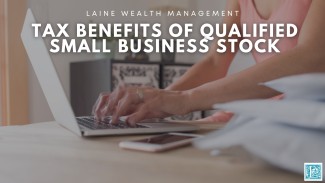
Tax Benefits of Qualified Small Business Stock
A valuable opportunity for founders and investors, but legislation looms
For founders and investors in start-ups, qualified small business stock (QSBS) offers a significant tax advantage that can be likened to a generous gift from the IRS. This tax provision allows shareholders to potentially realize substantial tax-free gains, providing a compelling incentive to invest in qualifying small businesses.
However, it is important to understand the nuances of QSBS and the potential impact of legislative changes, such as the stalled Build Back Better legislation.
Understanding QSBS
Qualified small business stock refers to shares issued by certain eligible small businesses that meet specific criteria outlined by the IRS. To qualify for the tax benefits associated with QSBS, the stock must meet several requirements, including:
Company Size: The issuing company must be a domestic C corporation with total gross assets of $50 million or less at the time of issuance.
Holding Period: The investor must hold the QSBS for a minimum of five years to be eligible for the tax benefits.
Qualified Business Activities: The company must be primarily engaged in a qualified trade or business, with certain excluded industries such as professional services, finance, and hospitality.
The Tax Benefit of QSBS
The primary tax benefit of QSBS lies in its potential exemption from capital gains tax. Under the current regulations, shareholders who meet the eligibility criteria can exclude a portion of their gains from the sale of QSBS from federal income tax. The excluded amount can be the greater of $10 million or ten times the original investment, allowing for significant tax savings.
Potential Impact of Legislative Changes
The proposed Build Back Better legislation may impact the perks associated with QSBS. While the legislation is currently stalled and subject to potential modifications, it is crucial to stay informed about the potential implications for QSBS investors. Proposed changes could limit or eliminate the tax benefits of QSBS, potentially reducing its attractiveness as a tax-saving strategy.
Workarounds and Maximizing Tax Benefits
Despite the potential challenges posed by legislative changes, there are potential workarounds and strategies to consider:
1. Act Before Legislative Changes: If the Build Back Better legislation or any future legislation imposes limitations on QSBS, acting before the effective date of the changes may allow investors to secure the current tax benefits. Engaging with tax professionals and legal advisors can help assess the potential impact and determine the best course of action.
2. Explore Alternative Structures: Depending on the specific circumstances and objectives, it may be possible to restructure investments or utilize alternative strategies to optimize tax benefits. Consult with knowledgeable professionals who can assess the feasibility of alternative approaches within the existing legal framework.
3. Stay Informed: As legislation evolves, it is essential to stay updated on the latest developments and consult with tax professionals to understand how changes may impact your specific situation. Tax laws can be complex and subject to frequent updates, making it crucial to seek professional guidance.
Stay Informed
Qualified Small Business Stock presents a significant tax benefit for founders and investors in start-ups.
By staying ahead of legislative changes and leveraging available strategies, you can potentially optimize the tax benefits associated with QSBS and make the most of your investments in qualifying small businesses.
Important Disclosures
The opinions voiced in this material are for general information only and are not intended to provide specific advice or recommendations for any individual. To determine which investment(s) may be appropriate for you, consult your financial professional prior to investing.
Investing involves risks including possible loss of principal. No investment strategy or risk management technique can guarantee return or eliminate risk in all market environments.
This information is not intended to be a substitute for specific individualized tax or legal advice. We suggest that you discuss your specific situation with a qualified tax or legal advisor.
This article was prepared by FMeX.
LPL Tracking #1-05375597

